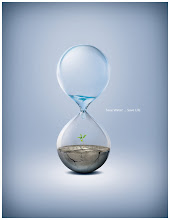Positive
Thinking
Jerry was the kind of
guy you love to hate. He was always in a good mood and always had something
positive to say. When someone would ask him how he was doing, he would reply,
“If I were any better, I would be twins!”
He was a unique manager
because he had several waiters who had followed him around from restaurant to
restaurant. The reason the waiters followed Jerry was because of his attitude.
He was a natural motivator. If an employee was having a bad day, Jerry was
there telling the employee how to look on the positive side of the situation.
Seeing this style
really made me curious, so one day I went up to Jerry and asked him, “I don’t
get it! You can’t be a positive person all of the time. How do you do it?”
Jerry replied, “Each morning I wake up and say to myself, Jerry, you have two
choices today. You can choose to be in a good mood or you can choose to be in a
bad mood.’ I choose to be in a good mood. Each time something bad happens, I
can choose to be a victim or I can choose to learn from it. I choose to learn
from it. Every time someone comes to me complaining, I can choose to accept
their complaining or I can point out the positive side of life. I choose the
positive side of life.”
“Yeah, right, it’s
not that easy,” I protested.
“Yes it is,” Jerry
said. “Life is all about choices. When you cut away all the junk, every
situation is a choice. You choose how you react to situations. You choose how
people will affect your mood. You choose to be in a good mood or bad mood. The
bottom line: It’s your choice how you live life.”
I reflected on what
Jerry said. Soon thereafter, I left the restaurant industry to start my own
business. We lost touch, but often thought about him when I made a choice about
life instead of reacting to it. Several years later, I heard that Jerry did
something you are never supposed to do in a restaurant business: he left the
back door open one morning and was held up at gunpoint by three armed robbers.
While trying to open the safe, his hand, shaking from nervousness, slipped off
the combination. The robbers panicked and shot him. Luckily, Jerry was found
relatively quickly and rushed to the local trauma center. After 18 hours of
surgery and weeks of intensive care, Jerry was released from the hospital with
fragments of the bullets still in his body. I saw Jerry about six months after
the accident. When I asked him how he was, he replied, “If I were any better,
I’d be twins. Wanna see my scars?”
I declined to see his
wounds, but did ask him what had gone through his mind as the robbery took
place. “The first thing that went through my mind was that I should have locked
the back door,” Jerry replied. “Then, as I lay on the floor, I remembered that
I had two choices: I could choose to live, or I could choose to die. I chose to
live.”
“Weren’t you scared?
Did you lose consciousness?” I asked. Jerry continued, “The paramedics were
great. They kept telling me I was going to be fine. But when they wheeled me
into the emergency room and I saw the expressions on the faces of the doctors
and nurses, I got really scared. In their eyes, I read, ‘He’s a dead man.’ I
knew I needed to take action.”
“What did you do?” I
asked.
“Well, there was a
big, burly nurse sh
 outing questions at me,” said Jerry. “She asked if I was
allergic to anything. ‘Yes,’ I replied. The doctors and nurses stopped working
as they waited for my reply… I took a deep breath and yelled, ‘Bullets!’ Over
their laughter, I told them, ‘I am choosing to live. Operate on me as if I am
alive, not dead.”
outing questions at me,” said Jerry. “She asked if I was
allergic to anything. ‘Yes,’ I replied. The doctors and nurses stopped working
as they waited for my reply… I took a deep breath and yelled, ‘Bullets!’ Over
their laughter, I told them, ‘I am choosing to live. Operate on me as if I am
alive, not dead.”
Jerry lived thanks to
the skill of his doctors, but also because of his amazing attitude. I learned
from him that every day we have the choice to live fully. Attitude, after all,
is everything.
.jpg)























